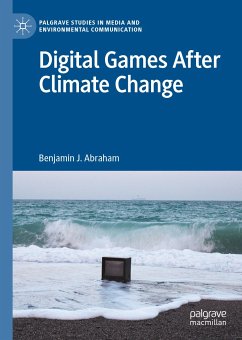"This is a book every game designer, publisher, and player needs to read. From calculating the footprint of shipping disks to itemizing every toxic metal inside a game console, Abraham paints a detailed portrait of the many ways in which creating and playing games is harmful to our global environment. You will never play a videogame the same way again."
- Eric Zimmerman, Game designer & Arts Professor, NYU Game Center.
- Brendan Keogh, Chief Investigator, Digital Media Research Centre (QUT) & President, Digital Games Research Association of Australia.
This book presents the first sustained analysis of the digital game industry's carbon footprint and its role in exacerbating global climate change. Identifying the ways videogames can actually help combat the climate crisis, it argues for the urgency of transitioning to a fully carbon neutral games industry, exploring the challenges and opportunities inherent in this undertaking. Beginning with an analysis of debates around the persuasive power of games, the book argues that real impact can only be achieved by focusing on the material conditions of game production - by reducing greenhouse gas emissions from making, selling, and playing games, as well as the hardware used to play them. Abraham makes a compelling argument that a sustainable games industry is possible, and outlines the actions that everyone can take to reduce the harms that digital games cause to people and planet.
Benjamin J. Abraham has spent the past decade researching digital media and videogames sustainability. He was previously a lecturer in digital and social media at the University of Technology Sydney, an affiliate of the Climate Justice Research Centre, and has recently moved on from academia.
Dieser Download kann aus rechtlichen Gründen nur mit Rechnungsadresse in A, B, BG, CY, CZ, D, DK, EW, E, FIN, F, GR, HR, H, IRL, I, LT, L, LR, M, NL, PL, P, R, S, SLO, SK ausgeliefert werden.
Es gelten unsere Allgemeinen Geschäftsbedingungen: www.buecher.de/agb
Impressum
www.buecher.de ist ein Internetauftritt der buecher.de internetstores GmbH
Geschäftsführung: Monica Sawhney | Roland Kölbl | Günter Hilger
Sitz der Gesellschaft: Batheyer Straße 115 - 117, 58099 Hagen
Postanschrift: Bürgermeister-Wegele-Str. 12, 86167 Augsburg
Amtsgericht Hagen HRB 13257
Steuernummer: 321/5800/1497
USt-IdNr: DE450055826
Bitte wählen Sie Ihr Anliegen aus.
Rechnungen
Retourenschein anfordern
Bestellstatus
Storno









